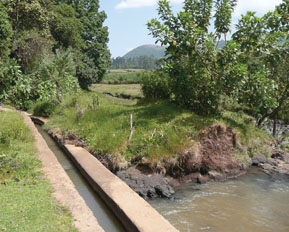17.6 Problems of using polluted water
The impacts of using contaminated water for drinking have been discussed in other study sessions. However, we use water for other purposes that can also be affected by water pollution such as irrigation, for livestock and for recreation.
Contaminants in irrigation water (Figure 17.3) may accumulate in the soil and, after a period of years, render the soil unfit for agriculture. Even when the presence of pesticides or pathogenic organisms in irrigation water does not directly affect plant growth, it may potentially affect the acceptability of the agricultural product for sale or consumption.

Poor quality water can affect livestock by causing death, sickness or impaired growth. Some substances, or their degradation products, present in water used for livestock may occasionally be transmitted to humans. The purpose of good quality water used for livestock watering is, therefore, to help protect both the livestock and the consumer.
Contaminated water also has health problems for those who swim in it. They may become ill if the water is contaminated with faecal material or with microorganisms that could cause gastrointestinal illness or ear, eye or skin infections. For example, schistosomiasis is contracted simply by swimming or standing in water that is contaminated with the Schistosoma worm.
17.5.3 Groundwater
